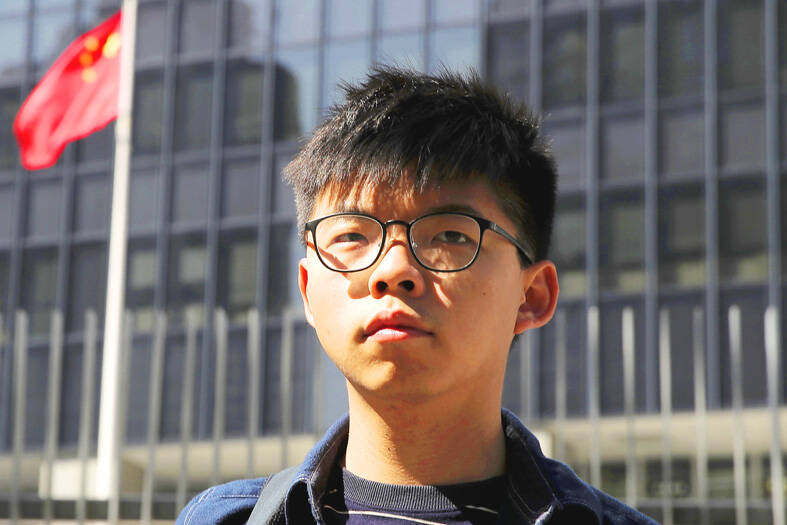Prominent activist Joshua Wong (黃之鋒) yesterday asked for a lesser sentence in court after he earlier pleaded guilty in Hong Kong’s biggest national security case.
Wong was one of 47 activists charged in 2021 under a Beijing-imposed National Security Law with conspiracy to commit subversion for their involvement in an unofficial primary.
The activists were accused of attempting to paralyze Hong Kong’s government and topple the territory’s leader by aiming to win a legislative majority and using it to block budgets indiscriminately.

Photo: AP
Wong and 44 others admitted their liability or were convicted by the court. They could be sentenced to life in prison, though those who pleaded guilty have a better chance of receiving shorter sentences. Their mass prosecution dealt a severe blow to the territory’s once-thriving pro-democracy movement.
Wong waved at the public gallery after he walked into the courtroom.
Former Democratic Party chairman Wu Chi-wai (胡志偉), former pro-democracy lawmaker Jeremy Tam (譚文豪) and activist Tam Tak-chi (譚得志) were among the five other activists who also appeared in court.
Wong’s lawyer, Marco Li (李國威), said his client should be considered an “active participant,” because he neither organized nor assisted in the unofficial primary.
The security law calls for active participants to face a jail term of between three and 10 years.
Li said Wong hoped that he could part with his past history and would be able to reform himself after serving his sentence.
He suggested the judges offer his client a one-third reduction of sentence given his guilty plea.
Wong first became a household name in Hong Kong as a teenager in 2012 for leading protests against the implementation of national education in the territory’s schools.
In 2014, he rose to fame as one of the student leaders in the Occupy Movement, during which demonstrators occupied streets for 79 days and brought traffic in some areas to a standstill, demanding direct elections for Hong Kong’s leader.
In the 2019 leaderless movement, Wong helped drum up overseas support for the protests. His activism resulted in Beijing calling him as an advocate of Hong Kong independence who had “begged for interference” from foreign forces.
When the security law was enacted on June 30, 2020, “Demosisto,” a political party he cofounded, was disbanded.
The mitigation hearings for the 45 convicted defendants are expected to continue until early next month and sentencing will come at a later date.
The National Security Law authorizes a range of sentences depending on the seriousness of the offense and the defendant’s role in it, going from under three years for the least serious to 10 years to life in prison for people convicted of “grave” offenses.

Auschwitz survivor Eva Schloss, the stepsister of teenage diarist Anne Frank and a tireless educator about the horrors of the Holocaust, has died. She was 96. The Anne Frank Trust UK, of which Schloss was honorary president, said she died on Saturday in London, where she lived. Britain’s King Charles III said he was “privileged and proud” to have known Schloss, who cofounded the charitable trust to help young people challenge prejudice. “The horrors that she endured as a young woman are impossible to comprehend and yet she devoted the rest of her life to overcoming hatred and prejudice, promoting kindness, courage, understanding

US President Donald Trump on Friday said Washington was “locked and loaded” to respond if Iran killed protesters, prompting Tehran to warn that intervention would destabilize the region. Protesters and security forces on Thursday clashed in several Iranian cities, with six people reported killed, the first deaths since the unrest escalated. Shopkeepers in Tehran on Sunday last week went on strike over high prices and economic stagnation, actions that have since spread into a protest movement that has swept into other parts of the country. If Iran “violently kills peaceful protesters, which is their custom, the United States of America will come to

‘DISRESPECTFUL’: Katie Miller, the wife of Trump’s most influential adviser, drew ire by posting an image of Greenland in the colors of the US flag, captioning it ‘SOON’ US President Donald Trump on Sunday doubled down on his claim that Greenland should become part of the US, despite calls by the Danish prime minister to stop “threatening” the territory. Washington’s military intervention in Venezuela has reignited fears for Greenland, which Trump has repeatedly said he wants to annex, given its strategic location in the arctic. While aboard Air Force One en route to Washington, Trump reiterated the goal. “We need Greenland from the standpoint of national security, and Denmark is not going to be able to do it,” he said in response to a reporter’s question. “We’ll worry about Greenland in

PERILOUS JOURNEY: Over just a matter of days last month, about 1,600 Afghans who were at risk of perishing due to the cold weather were rescued in the mountains Habibullah set off from his home in western Afghanistan determined to find work in Iran, only for the 15-year-old to freeze to death while walking across the mountainous frontier. “He was forced to go, to bring food for the family,” his mother, Mah Jan, said at her mud home in Ghunjan village. “We have no food to eat, we have no clothes to wear. The house in which I live has no electricity, no water. I have no proper window, nothing to burn for heating,” she added, clutching a photograph of her son. Habibullah was one of at least 18 migrants who died